- Home
- Mark Chadbourn
The Scar-Crow Men Page 9
The Scar-Crow Men Read online
Page 9
‘I suspect everyone until I have proof otherwise,’ Will replied. ‘There is too much that is unknown here, and little that makes sense with the information we have to hand. I would learn more first.’
A loud booming resonated from the deadhouse door above them. Will raised a hand to quiet the other two.
‘A watchman delivering a body,’ Carpenter whispered. ‘Or a beadle.’
At the top of the steps, the deadhouse door creaked open. A loud voice echoed, demanding entry.
‘That is no watchman,’ the Earl said quietly.
Other raised voices were followed by a cry that could only have come from the mortuary assistant.
‘Quickly.’ Flinging the shroud back over the corpse, Will whirled a pointing finger towards a haphazard pile of boards and unused trestles in a large alcove beside the steps. As they darted towards the hiding place, there was another cry and a clatter. The drunken assistant slid down the steps and sprawled on the flagstones, where he lay in a stupor, moaning gently.
The three spies eased themselves behind the trestles and boards and ducked low, finding positions where they could look out into the shadowy mortuary. They’d barely settled into place when the pounding of boots down the stone steps heralded the arrival of five men, their rapiers drawn. The intruders all wore tall-crowned, flat-topped black hats and black cloaks that reached down to their ankles. Will strained to see their faces, but they kept the brims of their hats pulled down. They paused at the foot of the steps and scanned the cellar before the leader said in a gruff voice, ‘Empty. Go.’
With well-drilled speed and efficiency, the other four men responded to the order, fanning out across the mortuary to examine the bodies on the trestles. Uneasy, Will wondered if they were part of the militia. Certainly, the leader stood with an air of authority as he watched his men move quickly around the underground room.
A low, short whistle came from the man who had found Gavell’s body under the sheet. The leader marched over to inspect the corpse and gave a nod of approval. With busy hands, the four other men wrapped the seeping body in the shroud and then, on a count of three, lifted it on to their shoulders.
Will, Carpenter and Launceston exchanged suspicious glances. Gavell’s remains belonged to his family. This theft went against the very laws of the land; no authority would have sanctioned such an act.
The men marched towards the steps, the leader following behind like a mourner. As he neared the hiding place, the glare of a candle lit his face under the brim of his hat. His eyes were the colour of steel, his cheeks pockmarked, and he sported a well-trimmed black beard. Will knew he had seen that face before, perhaps somewhere among the personal guards of one of the nobles at court, but he could not recall exactly.
The mortuary assistant moaned loudly as the intruders passed with Gavell’s body, and he struggled to raise himself up on his arms. The leader of the black-cloaked men stooped down to grab the drunken assistant’s filthy shirt at the neck, and with a rough movement hauled the bleary-eyed face up.
‘If anyone asks what happened to the body of the flayed man, you do not know,’ the steely-eyed man growled. ‘If you speak of this, you will quickly find yourself one of your own customers. Do you understand?’
His eyes wide with fear, the assistant nodded.
The leader of the intruders flung the man back down on the flagstones, and waved a hand at his waiting men. ‘Get him out to the cart and away, quickly. Like the last one,’ he ordered in a low, gravelly voice. ‘No trace must remain.’
The men lurched up the steps with the sticky, cloth-wrapped body, and after a glance around the vaults the leader followed, casting one final, brief look at the mortuary assistant. In that stare, Will read the man’s thoughts: he considered killing the drunken sot, but knew it would raise even greater questions. A missing body could be explained away. A murdered mortuary assistant would have consequences.
When the deadhouse door boomed shut behind the intruders, the drunken man released a pathetic whimper and scrambled up the steps, no doubt to lose himself in more beer. The three spies eased themselves out from their hiding place and stood in troubled silence for a moment.
‘What does this mean?’ Carpenter asked quietly. ‘He said, Like the last one.’
‘Another murder, then,’ Launceston mused. ‘Hidden before we heard of it. But who was the victim?’
‘Someone at court is covering the bloody trail,’ Will replied, his expression grave. ‘This plot reaches further than we ever imagined – to the heart of England itself.’
CHAPTER THIRTEEN
CUPPING HIS HAND AROUND THE CANDLE FLAME, OSWYN HASARD strode through the silent chambers of the sleeping Nonsuch Palace. The glow flared under the brim of his tall-crowned hat, lighting the steel in his eyes. Though it had been three hours’ hard riding from London, the stink of the deadhouse still clung to the black-cloaked man. The flayed body had been weighted with stones and dumped in the river to feed the fishes, like the other two, and his men had been sent to their beds, their lips sealed. With still an hour to dawn, the night had been a success.
Whispered voices reached his ears as he neared the oak-panelled chamber overlooking the palace gardens. Glimpsing the faint glow of a candle, he moistened his thumb and forefinger and extinguished the flame of his own light, slowing as he reached the door, which stood ajar. Peering through the crack, he saw his master, Lord Derby, in huddled conversation around a stubby candle with the Earl of Essex. The two men could not have been less alike: Essex, strong, handsome and filled with the vigour of youth, aglow in his white doublet and cloak; Derby, heavy-set in his black gown, broken-veined cheeks the colour of ham above his wiry grey beard. The darkness appeared to press in tightly around the two figures.
‘Why should I trust you?’ Essex was asking, eyeing the other man suspiciously.
‘I have your best interests at heart, as always,’ Derby responded firmly. ‘The Queen’s Little Elf has become troublesome within the Privy Council, guiding Her Majesty away from the light and into the shadows. He can no longer be trusted.’
The Earl’s eyes gleamed. Exactly what he wants to hear, Hasard thought.
‘Cecil’s power is based in part upon his network of spies. If they were constrained … relieved of their influence … crushed … there would be an opportunity for your own band of spies to gain ascendance,’ Derby continued in a whisper, ‘and the Queen would have no choice but to anoint you as her true favourite at court.’
Essex tugged at his beard, already imagining the power he might wield. ‘And what do you gain from seeing Cecil cut down to his true size?’
‘There are a few of us in the Privy Council, at court, in positions of authority, who are distressed at the path England has taken since the glorious defeat of the Spanish navy. At that moment we were on the cusp of a golden age. Power. Control of trade. Influence.’ Derby’s eyes flashed. ‘All that opportunity has slipped through our fingers. We are beset on every side by enemies, including the one we fear most.’
Essex nodded gravely.
‘I do what I do for England,’ Derby continued. ‘There is no personal gain.’
‘Noble motives,’ the Earl replied with a nod. ‘At first I feared this was some plot to dethrone Elizabeth. If that were true, I would have been forced to move against you. As it is …’ He paused thoughtfully. ‘Cecil’s spies must be removed from the game in the first instance, and then … we shall see.’
With undue eagerness, Derby grasped the other man’s hand and pumped it. ‘You have made the right choice,’ he said. ‘Those who do not stand with us are against us.’
Essex nodded, smiled and made to remove his hand, but Derby held fast. Hasard felt a ripple of unease. Wide-eyed and grinning, the older man leaned forward, a soft, breathy laugh escaping his gritted teeth. With his thumb, he began to stroke the back of the Earl’s hand. The caress was not a suggestion of intimacy, Hasard could tell, but it was still breathtakingly inappropriate. His master looked as if he
had lost his wits.
Unsettled, Essex tore his hand free, muttered a goodbye and hurried away. Hasard pressed himself back into the shadows so he would not be seen.
When the Earl had disappeared into the dark along the corridor, the cloaked man slipped into the oak-panelled chamber. With a sly smile, Derby nodded, once more the man Hasard recognized. ‘All is well,’ the newcomer said, still uneasy. His master was a man of propriety, restrained, sophisticated, aloof. He had never behaved in such a manner before.
‘Good,’ Derby replied, beckoning his assistant closer to the candle flame. ‘Our plans move apace. We now pull the strings of the Earl of Essex. In thrall to his ambition, he will do all that we wish.’
But who pulls your strings? Hasard wondered.
‘Our numbers grow by the week,’ Derby continued, rubbing his hands eagerly. ‘Our influence reaches into all parts of the government, and soon, very soon, we will be ready to make our move. For now, I have more work for you and your men.’
‘Another body to dispose of?’
‘Not yet. I fear Cecil’s spies are becoming aware. We must act quicker than we intended. Harry them at every turn. Seek out Swyfte – he is the most dangerous when roused. But his men, too, must be driven off course. Go to Bankside first, where they waste their days and nights in the stews and inns and gaming halls. Search all London. Do not allow them to rest for a moment. Capture them, if you can. Kill them, if you must. They are a threat to England’s future prosperity.’
‘Very well.’ Hasard bowed.
‘I will send someone to help you.’
‘Who?’
‘You will not see him, but he will be there.’ Derby looked past his assistant to the door where Danby the coroner had entered silently, with another, hooded man who clutched four fat candles to his chest. Hasard was disturbed to see a long trail of spittle hanging from the corner of the coroner’s mouth.
‘Go now, Master Hasard, and help us usher in a new age for England.’ Derby waved his hand to dismiss his assistant.
Hasard left, unnerved by the fire he saw burning in Danby’s eyes. As he passed the two new arrivals, he looked into the deep hood and was shocked to see the face of a devil. Only when he had stepped out of the door did he realize it was a mask, fiery red, with a jagged crack running across it.
Hurrying into the palace’s dark, Hasard discerned the faint words of Derby as he greeted the two other men: ‘Now we must listen carefully to the whispers of our masters in the shadows.’
CHAPTER FOURTEEN
CARPENTER LISTENED TO THE TERRIFIED WHIMPERINGS, BUT HIS mind was elsewhere. A dark foreboding had gripped him from the moment he left the deadhouse and even the light of day could not dispel it.
On the other side of the cramped room tucked away in the rafters of a timber-framed Bankside house, Launceston pressed his dagger to the neck of the kneeling landlord, his other hand dragging the man’s head back by his greasy hair. The landlord looked like a bullfrog, eyes bulging with fear above a flat, broad nose and fat lips, his filthy linen undershirt barely concealing his large belly and badly worn breeches.
Christopher Marlowe’s secret lodgings had been torn apart, the bed upended, loose boards ripped up to reveal the mouse droppings and straw beneath; the small table lay upturned, the chair in pieces. Shards of plaster had been torn from the walls in a search for hiding places and now lay in heaps everywhere. White dust coated all the surfaces, whipped into whirls by the breeze from the open door so that it appeared to be snowing in the shaft of sunlight breaking through the little window.
‘Who did this?’ the pallid man demanded as if he were asking the time of day.
‘Four men!’ his prisoner gulped. ‘They came in the night three days ago!’
‘And you have not yet cleaned and relet these premises? I have never known a landlord to leave a room sitting empty.’ The Earl surveyed the room’s detritus for anything important that he might have missed.
‘I was afraid. In case they came back.’ Spittle sprayed from the fat man’s mouth.
The room was barely ten foot square, cheap in an area where all rooms cost little rent, but it would have served Marlowe’s purpose, Carpenter knew. Few would have come looking for the famous playwright there among the cutpurses, and apprentices, and poor field labourers.
‘What did they look like?’ Launceston pressed.
‘I did not see their faces. When they forced their way in, I hid in my room until they had done their business,’ the terrified man babbled.
‘Rogues? Or gentlemen?’ Carpenter sifted through a bundle of papers scattered across the boards. It was the remnants of an unfinished play in Marlowe’s spidery scrawl. Nothing of importance, he thought.
The landlord rolled his wide eyes towards the scar-faced man. ‘Not rogues. I saw fine clothes.’
Carpenter glanced over in time to see Launceston’s dagger wavering over the pulsing artery in the landlord’s neck. The Earl had the familiar hungry gleam in his eye.
‘Robert,’ Carpenter cautioned. His voice was understated, but the pale man knew the meaning by now. Reluctantly, the Earl removed the blade and thrust the landlord roughly across the boards.
The fat man clutched his hands together and insisted, ‘I speak the truth! Marlowe only wrote his plays here. He kept nothing of value.’
‘Then why would gentlemen be searching his room?’ Carpenter continued.
The landlord gaped stupidly. Knowing any more questions would be futile, the scarred spy grabbed the neck of the landlord’s shirt and dragged him to the open door. A loud crashing echoed as the man half fell, half threw himself down the winding stairs.
Carpenter kicked the door shut. ‘Our suspicions are proving correct. Marlowe’s room searched on the night of his death. Sweeping up any filthy trail left in the wake of a murder. And no lone killer, either. A plot, then.’
Launceston’s hand was trembling as he sheathed his dagger. ‘Marlowe offended many people in his short life. But this smacks of careful planning and authority.’
The scar-faced man crossed to the small window and peered out over the thatch and clay tiles of the Bankside rooftops towards the river. ‘This is not good weather for any of us. Yet I cannot see a pattern here. In Marlowe’s murder the culprit is known, and no attempt was made to hide the body or the crime. But the attack on Will at the Rose was a different matter, as was the brutality inflicted on Gavell.’
‘If the Unseelie Court truly is eliminating spies who know of them, one by one, there may well be no pattern,’ the Earl mused. ‘Any means of dispatch would suffice.’
‘But this is a conspiracy of madness.’ Carpenter watched the men at work in the fields and dreamed of another life. ‘Men at court working alongside our traditional Enemy? That is like lambs lying down with wolves.’
He had a sense of the world closing in around him. It was bad enough that his only real friend was Launceston, who appeared to have no human feelings and lived only for killing.
‘Hurrm,’ the Earl grunted at his back.
‘What is it?’ Carpenter snapped.
‘The room has been torn apart. Whoever did it must have believed that Marlowe had information which could be of use to us.’ The pale-faced man continued to turn slowly, studying every aspect of his surroundings. ‘What did our playwright discover?’
Carpenter righted a stool and sat on it. ‘We might have got more information from the landlord if you hadn’t been overcome by your feverish desire to draw blood,’ he growled irritably.
‘And do you think it is pleasant for me to listen to your whining morning, noon and night?’ Kneeling, the Earl began to examine the upended table.
‘And that is the thanks I get? Where would you be without me? Your head on a pike at the bridge gates, I would wager.’ The surly Carpenter kicked a goblet across the room in anger. ‘What now? Are you ignoring me?’
Launceston traced his pale fingers across the tabletop and then righted it. With the back of his hand, he brushed
off the dirt and then grabbed a fistful of plaster dust, spraying it across the wood. Carpenter watched him curiously. Leaning close to the surface, the Earl gently blew the surplus dust away. He studied what remained behind for a moment and then said, ‘Here.’
The scar-faced man came over and saw, first of all, an outline in white where the dust had filled the grooves carved by a knife. It formed a circle with a square within it, the same symbol that they had both witnessed at the deadhouse, carved into the back of the spy Gavell.
‘Marlowe knew of Gavell’s murderer,’ Carpenter said in a quiet, thoughtful voice.
‘Or he must have known this sign had some special significance.’ The Earl drew a finger around the outline. ‘I would say he carved it here one night, while ruminating over the meaning of what he had discovered.’
‘There.’ Carpenter pointed to letters carved into the wood near the symbol.
Launceston threw more plaster dust on the surface to make the words clearer. ‘Clement. Makepiece. Swyfte. Marlowe. Gavell. Shipwash. Pennebrygg. And here, further down, Devereux, with a question mark.’
‘Robert Devereux? The Earl of Essex?’
‘Perhaps. The family is old, with many branches.’
Carpenter’s eyes widened. ‘All spies. Swyfte, Marlowe, Gavell – in order. If this is a list of victims, then those poor bastards Clement and Makepiece are already dead. I have not seen either of them in recent weeks.’
‘Nor I.’
‘We must warn Shipwash and Pennebrygg—’
Launceston held up a hand to silence his companion. ‘Think clearly, you droning codpiece. Why are these spies listed out of all our fellow liars, cheats and murderers? How would Marlowe know these names in advance of the murders being committed, or some of them, at least?’
A noise at the door brought a flash of steel. In an instant, the two men were either side of the entrance, silent, poised, glinting daggers at the ready. At Carpenter’s nod, Launceston tore open the door and dragged in a figure in a grey-hooded cloak, poised on the threshold.

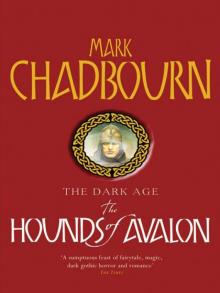 The Hounds of Avalon tda-3
The Hounds of Avalon tda-3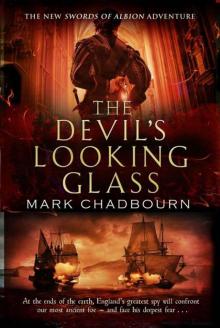 The Devil's Looking-Glass soa-3
The Devil's Looking-Glass soa-3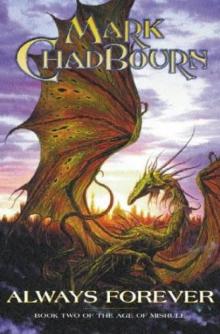 Always Forever taom-3
Always Forever taom-3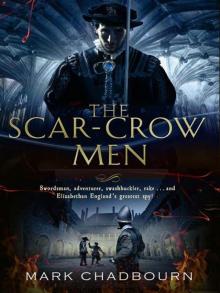 The Scar-Crow Men
The Scar-Crow Men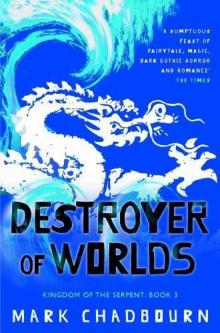 Destroyer of Worlds kots-3
Destroyer of Worlds kots-3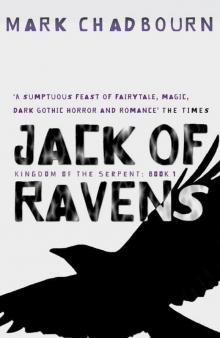 Jack of Ravens kots-1
Jack of Ravens kots-1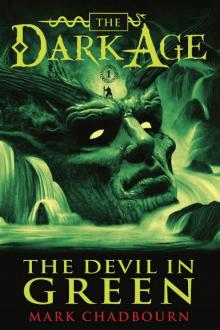 The Devil in Green
The Devil in Green World's End
World's End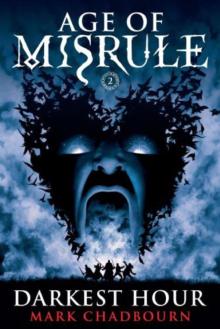 Darkest Hour (Age of Misrule, Book 2)
Darkest Hour (Age of Misrule, Book 2) Destroyer of Worlds
Destroyer of Worlds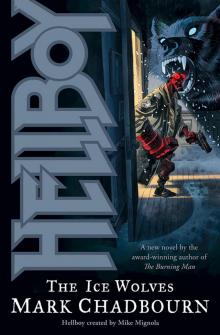 The Ice Wolves
The Ice Wolves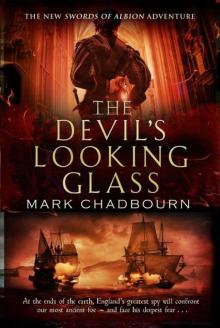 The Devil soa-3
The Devil soa-3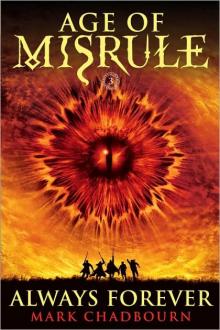 Always Forever
Always Forever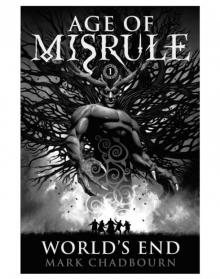 World's End (Age of Misrule, Book 1)
World's End (Age of Misrule, Book 1)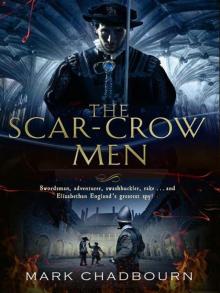 The Scar-Crow Men soa-2
The Scar-Crow Men soa-2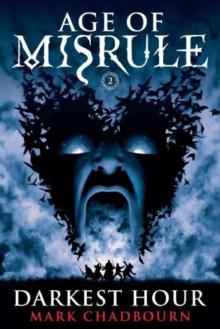 Darkest hour aom-2
Darkest hour aom-2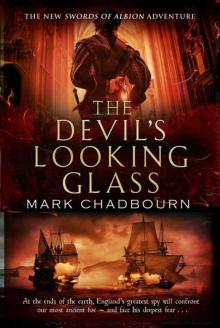 The Devil's Looking-Glass
The Devil's Looking-Glass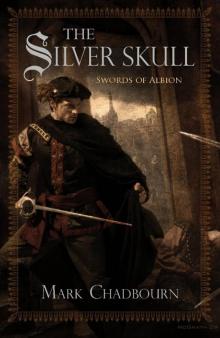 The Silver Skull
The Silver Skull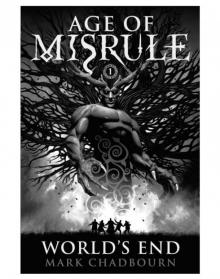 World's end taom-1
World's end taom-1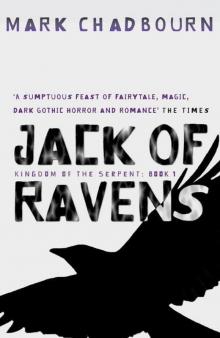 Jack of Ravens
Jack of Ravens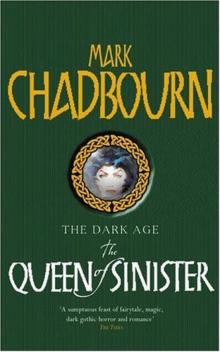 The Queen of Sinister
The Queen of Sinister